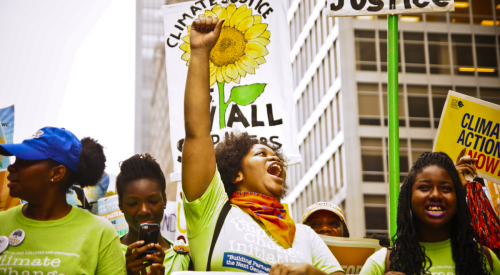Climate Justice and Resiliency in Communities of Color
By Qiao Kuang · August 7, 2018
Millions of people in the world’s most vulnerable and marginalized communities feel the worst impacts of climate change—including destruction by storms and flooding, crop failure caused by extreme drought, and deaths resulting from exposure to extreme weather conditions in areas with high levels of disinvestment. Climate issues cut across silos, merging social and economic conditions, environmental justice concerns, ecological factors and political domination. To mitigate the effects of climate change, individuals, organizations and institutions must work together within a climate justice framework, incorporating an analysis that considers the impacts of poverty and environmental racism. If done thoughtfully and with the inclusion of those most impacted, climate justice practices can lay a new foundation that will help us achieve both global justice and ecological balance.
Climate justice focuses on the root causes of poor environmental health, and includes the understanding that no single group or field can stop climate change alone. It recognizes that we will not slow climate change if we do not change the status quo—the neo-liberal, profit-centered economy that prevents us from achieving sustainable and thriving societies. It is the idea that globalization by corporations must be stopped to achieve justice for all.
Community-led solutions are at the heart of climate justice. Actions that prioritize the well-being of local communities, Indigenous peoples and the global poor, while also emphasizing biodiversity and the protection of ecosystems, will be most successful.
Indigenous peoples, nomadic communities, fisherfolks, and especially women in these communities, have been able to live harmoniously and sustainably with the Earth for millennia. Not only are they the most affected by climate change, but they are also the most affected by false solutions and grand climate proposals, such as genetic modification, building of mega-dams, and carbon capture and storage.
True solutions must focus on more sustainable practices of the peoples and communities that have lived and worked on the land, rather than emphasizing market-based climate mitigation schemes. The following groups are working successfully to alleviate the effects of climate change in their communities in sustainable ways:
Texas Environmental Justice Advocacy Services is dedicated to providing members of their community with tools to create sustainable and healthy environments through educational efforts, empowering individuals with environmental laws and regulations to enforce in their own communities, and providing capacity building skills and resources to improve community action and greater public participation.
The New Mexico Acequia Association (NMAA) is a statewide voice for advocacy around land-based acequia farmers and ranchers who were looking at establishing good policy/water law that promoted acequias’ thriving. They are committed to growing healthy food for families and communities, and honoring their cultural heritage. NMAA just recently held a conference highlighting innovative ways that acequia leaders are managing water, ensuring soil health, and communicating with neighbors to overcome dry times.
Asian Pacific Environmental Network (based in Oakland, California) continues to advocate for Asian and Pacific Islander communities and their right to a healthy and thriving community to live, work, learn, and play. They’ve successfully advocated against the expansion of the Chevron Richmond Refinery, located next to low-income people of color communities, to prevent further spills and explosions that spread toxic fumes and chemicals to these communities.
The Indigenous Environmental Network collaborated with various organization to create a network to support indigenous and native food sovereignty by reverting to traditional ways of agriculture using seeds that pre-existed the arrival of white settlers (and genetic modification). These would have naturally evolved to thrive in local ecosystems, and would lead to a greater biodiversity than our current food system allows.
Women’s Earth & Climate Action Network, International is a climate justice-based initiative established to united women around the world as stakeholders in sustainable solutions, policy advocacy, and the global movement towards building for social and ecological justice.
In this political climate, where our national government is empowering climate-deniers and rolling back progress in environmental protections, local- and state-level solutions are carrying the momentum forward for climate action. Coalitions across the country are working with labor and economic justice advocates to advance climate policy that invests in communities. Climate change is here and is a dire public health issue. The public health sector increasingly responds to health emergencies resulting from climate change and extreme weather. If we do not take action now, these emergencies will continue to unfairly harm those communities most in need, and likely on a grander scale.


